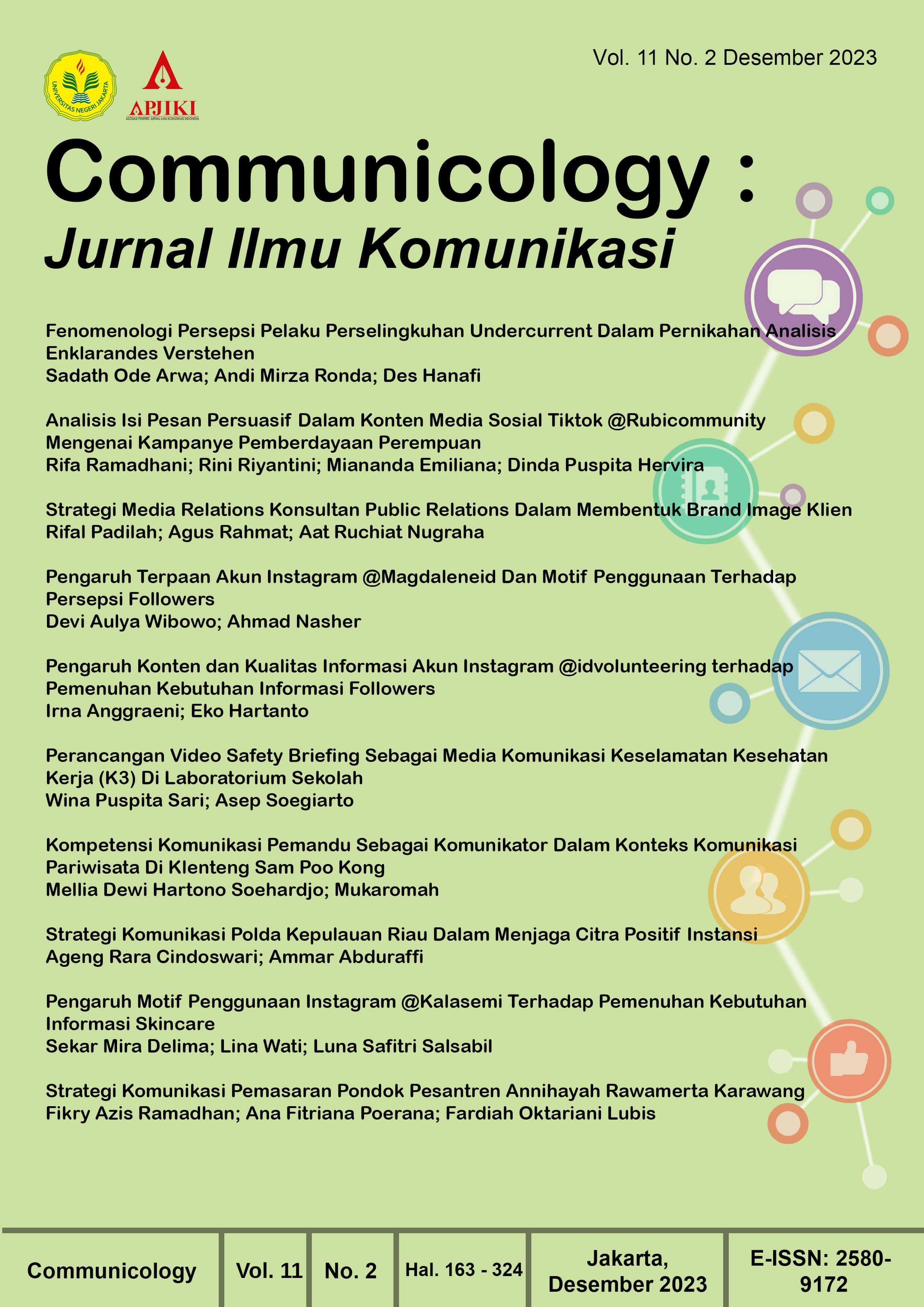Pengaruh Terpaan Akun Instagram @magdaleneid dan Motif Penggunaan Terhadap Persepsi Followers
DOI:
https://doi.org/10.21009/COMM.1102.04Kata Kunci:
Persepsi, Terpaan media, Motif pengguna mediaAbstrak
ABSTRACT
This study focuses on mass communication's evolution in response to the emergence of new media. Presently, social media has gained unparalleled popularity. As per Hootsuite data, active social media users in Indonesia represent 60.4% of the population, encompassing approximately 167 million users. Remarkably, Instagram alone captures 86.5% of the entire active social media user base in Indonesia. Thus, this research aims to ascertain how exposure to the Instagram account @magdaleneid and its usage motives impact followers' perceptions.The utilized theory is the "uses and gratifications" theory. Employing a quantitative approach within the positivism paradigm, this study includes 399 respondents—active Instagram users following @magdaleneid. Sampling relies on purposive sampling technique. The analysis incorporates validity tests, reliability tests, classic assumption tests, multiple linear regression tests, F tests, and coefficient of determination for questionnaires and data. The findings from the F test reveal that both media exposure and motives for media usage exert partial influence on followers' perceptions of the Instagram account @magdaleneid. The acceptance of Ha and rejection of H0 substantiate this. The results of the multiple linear regression test demonstrating a positive effect. Notably, the motive usage variable emerges as a stronger influencer on followers' perceptions.
ABSTRAK
Penelitian ini berlatar belakang dari komunikasi massa yang mengalami perkembangan setelah adanya new media. Media yang paling digemari saat ini yaitu media sosial. Menurut data hootsuit pengguna aktif media sosial di Indonesia sebanyak 60,4% dari populasi di Indonesia. Sekitar 167 juta masyarakat Indonesia aktif dalam menggunakan media sosial. Instagram sendiri memiliki memiliki 86,5% pengguna dari jumlah populasi pengguna aktif media sosial di Indonesia. Jadi berdasarkan latar belakang tersebut maka tujuan penelitian ini untuk mengetahui pengaruh terpaan akun Instagram @magdaleneid dan motif penggunaan terhadap persepsi followers. Teori yang digunakan dalam penelitian ini adalah teori uses and gratifications. Metode yang digunakan dalam penelitian ini adalah pendekatan kuantitatif dengan paradigma positivism. Responden berjumlah 399 orang, adalah pengguna aktif Instagram yang merupakan followers akun Instagram @magdaleneid. Pengambilan sampel menggunakan Teknik purposive sampling. Kuesioner beserta data diolah menggunakan uji validitas, uji reliabilitas, uji asumsi klasik, uji regresi linear berganda, uji F dan koefisien determinasi. Berdasarkan uji F, variabel terpaan media dan motif penggunaan media berpengaruh terhadap persepsi followers pada akun Instagram @magdaleneid secara simultan. Hal ini dibuktikan dengan Ha diterima dan H0 ditolak. Dari hasil uji linear berganda penelitian ini menyatakan bahwa penelitian ini berpengaruh positif dan terlihat bahwa variabel motif penggunaan media lebih besar memberikan pengaruh terhadap persepsi followers.
Referensi
Liu, X., Min, Q., & Han, S. (2020). Understanding users’ continuous content contribution behaviours on microblogs: An integrated perspective of uses and gratification theory and social influence theory. Behaviour & Information Technology, 39(5), 525-543.
Hairunnisa, Noor, M., & Dirahman, C. G. (2018). PEMANFAATAN MEDIA PADA PENERAPAN TEKNIK KOMUNIKASI PROGRAM RELOKASI DI KELURAHAN GUNUNG KELUA. Nasional Komunikasi, 223.
Hermawanti, F., Prisanto, G. F., Yulianto, K., & Ruliana, P. (2021). Pengaruh Terpaan Media #GundikLintasBUMN Pada Twitter terhadap persepsi profesi pramugari. Prosiding Hubungan Masyarakat, 2020, 346–356.
Hussain, A., & Shabir, G. (2020). Cognitive needs and use of social media: A comparative study of gratifications sought and gratification obtained. Information Discovery and Delivery, 48(2), 79-90.
Kaur, P., Dhir, A., Chen, S., Malibari, A., & Almotairi, M. (2020). Why do people purchase virtual goods? A uses and gratification (U&G) theory perspective. Telematics and Informatics, 53, 101376.
Kustiawan, W., Siregar, F. K., Alwiyah, S., Lubis, R. A., Gaja, F. Z., Pakpahan, N. S., & Nurhayati. (2022). KOMUNIKASI MASSA. Analytica Islamica, 11.
Ningrum, R. K., & Prihantoro, E. (2020). PENGARUH INTENSITAS DAN MOTIF PENGGUNAAN MEDIA INSTAGRAM TERHADAP KEPUASAN MENDAPATKAN INFORMASI FOLLOWERS AKUN @soloinfo. Jurnal Riset Mahasiswa Dakwah Dan Komunikasi (JRMDK) Vol., Vol. 2 No.(2), 60–67.
Rulli Nasrullah. (2015). Media Sosial : Prespektif Komunikasi, Budaya, Sosioteknologi. Simbiosa Rekatama Media.
Sitar, V., & Karsa, S. I. (2019). Persepsi Mengenai Tayangan Youtube Jurnalrisa # 31 “ Jangan Kambing Hitamkan Mang Emen ”. Posiding Manajemen Komunikasi, 5(2), 331.
Sugiyono. (2019). METODE PENELITIAN DAN PENGEMBANGAN (Research and Development/ R&D). Alfabeta.
Utami, A. D., Farid, M., & Sonni, A. F. (2019). Persepsi Ibu Rumah Tangga terhadap Serial Drama Televisi Elif di SCTV (Riset Audiens di Kelurahan Caile Kabupaten Bulukumba). Kareba:Jurnal Ilmu Komunikasi, 8(1), 150–168.
Valenzuela, S., Bachmann, I., & Aguilar, M. (2019). Socialized for news media use: How family communication, information-processing needs, and gratifications determine adolescents’ exposure to news. Communication Research, 46(8), 1095-1118.
Wardhani, D., HESTI, S., & DWITYAS, N. A. (2019). USES AND GRATIFICATIONS OF SOCIAL MEDIA: MEDIA USE AMONG UNIVERSITY STUDENTS IN JAKARTA. International Journal of Communication Research, 9(1).
Unduhan
Diterbitkan
Cara Mengutip
Terbitan
Bagian
Lisensi
Authors who publish with this Journal agree to the following terms:
- Author retain copyright and grant the journal right of first publication with the work simultaneously licensed under a creative commons attribution licensethat allow others to share the work within an acknowledgement of the work’s authorship and initial publication of this journal.
- Authors are able to enter into separate, additional contractual arrangementfor the non-exclusive distribution of the journal’s published version of the work (e.g. acknowledgement of its initial publication in this journal).
- Authors are permitted and encouraged to post their work online(e.g. in institutional repositories or on their websites) prior to and during the submission process, as it can lead to productive exchanges, as well as earlier and greater citation of published works.
Users/public use of this website will be licensed to CC BY





